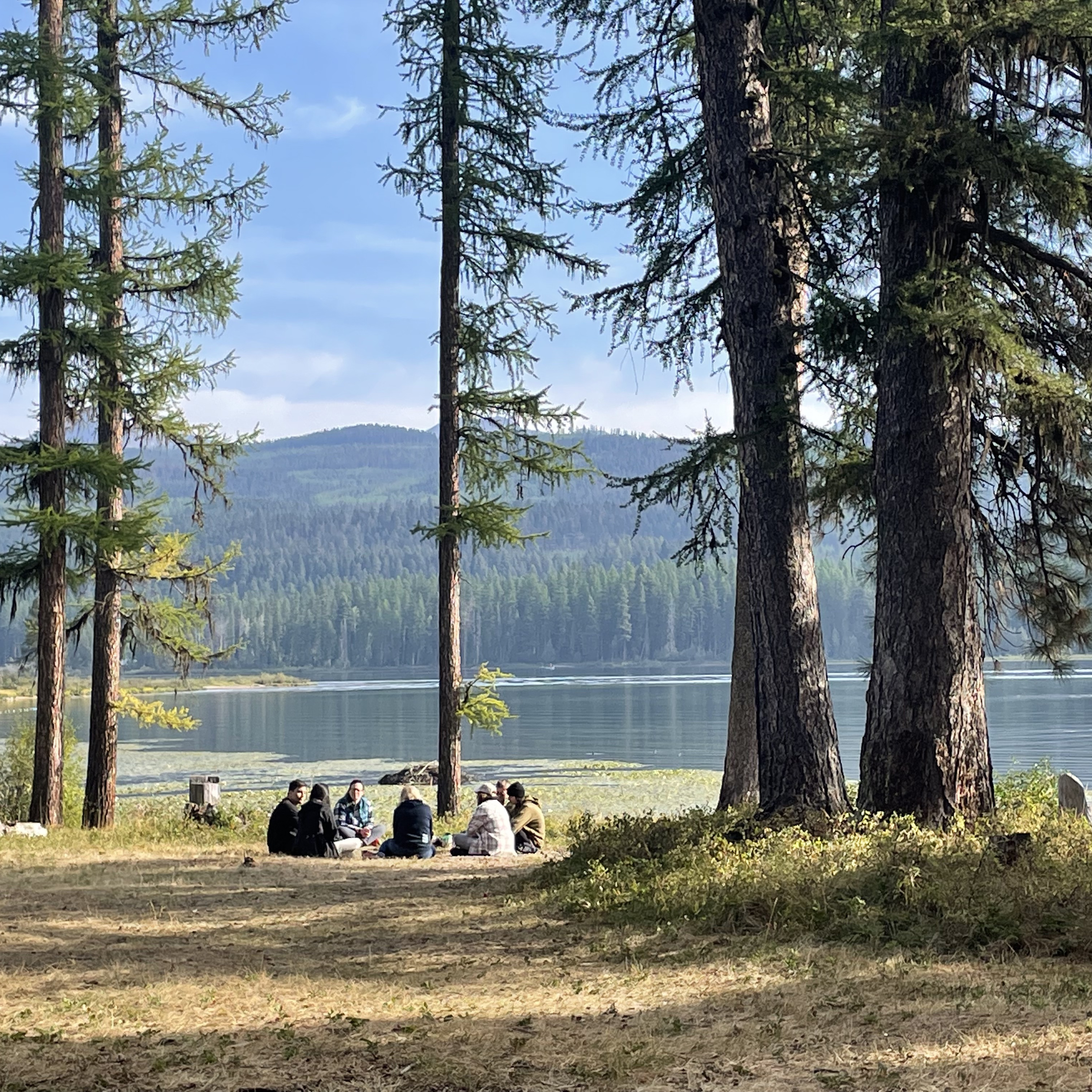The Latest From Our Faculty
Faculty Spotlight
-

PEAS Farm Instructor Caroline Stephens
Caroline has been focusing her work on food sovereignty initiatives that are part of the Four Sisters Garden at the PEAS Farm. This is her second year of mentoring students who serve as caretakers in the garden and working closely with All Nations Health Center and People's Food Sovereignty Program to develop workshops and other events in the Four Sisters Garden for Native students and community members.
This fall, Caroline worked with the garden caretakers to develop a special field experience for four students – a trip to Fort Berthold Reservation in North Dakota to meet with PEAS Farm Four Sisters Garden partners with Mandan Hidatsa Arikara Nation. It was an adventurous trip with many stories, shared meals, and lessons on how best to honor the garden, the plants, and our community. She enjoyed closing out this harvest season sharing meals with students at the Stolen Waters Summit, where she worked with students and UM Dining to ensure First Foods were featured during this event.
-

Visiting Professor Paul Guernsey
Paul has been working to revitalize the native plant garden at the UM PEAS Farm and facilitate botanical programming for Indigenous youth. He also published an essay in the Bank Street Occasional Paper Series titled, 'It Feels Fake': Decolonizing Curriculum and Pedagogy in Predominantly White Institutions. Paul recently received a Humanities Montana grant to support the Environmental Studies-sponsored conference called the Stolen Waters Summit. Paul has made valuable contributions to our curriculum, teaching courses titled: Indigenous and Environmental Justice, and Colonialism and Environmental Policy.
-

Assistant Professor Mark Sundeen
Mark worked with Environmental Studies and Indigenous graduate students to host the Stolen Waters Summit, Nov. 1-3, 2023. The successful, well-attended gathering of Indigenous scholars, activists, writers, elders, artists, musicians and farmers. His book of essays, Delusions & Grandeur, was acquired by U of NM Press for publication in 2025. He earned the Ellen Meloy Desert Writers Award as well as a Merit Award from the College of Humanities & Sciences. We appreciate Mark’s vision and energetic leadership with the Stolen Waters Summit. We are thrilled to share Mark’s accomplishments and well-deserved recognition!
-

Assistant Professor Fernando Sanchez
In early October, Fernando co-hosted a delegation from the Blackfoot Confederacy, which included leaders from the Blackfoot Way of Life, the Horn Society, the Brave Dog Society, the Thunder Pipe Society, and the Blackfeet Shield Keepers. The delegation shared ceremonies and teachings with the UM community to kick off events funded by a $1 million Mellon Foundation grant to host Indigenous elders and support integrating Indigenous ways of knowing and Native expertise into the curriculum. Fernando serves as the Principal Investigator for the grant and director of UM’s Eloise Cobell Land and Culture Institute.
-

Associate Professor David Owens
David has been bolstering pre-service science teachers’ competencies to use evidence-based environmental and science education instruction to prepare students to respond to current issues. Students in the Conservation Education course that Dave co-teaches with Jennifer Robinson, a UM doctoral student who also directs education programs at the Montana Natural History Center, are out in classrooms and the field observing seasoned environmental educators facilitate instruction. Dave is also influencing the work of in-service teachers and policymakers through his research, for example, through an article titled “What’s in a name? The use of induced perspective taking to inform arguments about the appropriateness of the term ‘Chinavirus’ when talking about COVID‑19,” recently published in Cultural Studies of Science Education. We are excited that Dave will be teaching Fundamental of Environmental Education in the Spring for EVST.
-

Associate Professor Robin Saha
Robin’s ReslienceMT NOAA-fund climate resiliency literacy project is in full swing this fall. This collaborative project with UM’s spectrUM Discovery Area works with rural and tribal communities in Montana to build resilience to wildfires, drought, flooding, and extreme heat. ReslienceMT recently brought a Mobile Climate Resilience Exhibit to Hamilton Middle School and Corvallis High School. The Exhibit – now at the Missoula Public Library – includes hands-on and digital elements, including ESRI Story Maps with videos. The project recently collaborated with the Bitterroot Climate Action Group on two Community Climate Resilience Forums designed to advance climate action planning in the Bitterroot Valley.
-

Professor Neva Hassanein
This fall Neva received a $30,000 grant from the High Stakes Foundation. It provides funds for Montana Good Works Fellowships to support professional internships for EVST graduate students and special opportunity funds for student projects in sustainable food and farming. This fall Neva and Caroline Stephens hosted a fundraising event called "PIES & PEAS,” a celebratory gathering, with student and community support, that raised funds for student scholarships. Graduate student MaKenna Landry shared at the event: “Growing food this summer for those in need has solidified my passion: to work towards a future where food security is not a privilege but a fundamental right.” If you'd like to donate to support student access to truly transformative experiences at the PEAS Farm, you can donate here.
-

Assistant Professor Margiana Petersen-Rockney
Margiana will be joining the Environmental Studies faculty in January 2024. A political ecologist who works on climate equity and agrarian change, including adaptive capacity in working landscapes; agricultural responses to environmental change; and water and land use policy and racial equity in a changing climate. Currently, she is doing post-docs at UC-Berkely and Harvard University. We are thrilled to have Margiana joining us.
